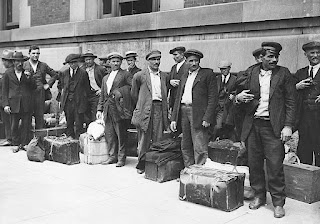Blog Roundup
Friday, October 18, 2024
A Friday Hodgepodge
1. "New ARI Book Examines What Went Wrong After 9/11," (2021) by Elan Journo and Onkar Ghate (New Ideal):
This book presents the Ayn Rand Institute's distinctive analysis of what's wrong with America's response to the Islamist threat since 9/11. We argue that the fundamental problem lies in irrational philosophic ideas that permeate -- and subvert -- American foreign policy. You can see those ideas at work in the failure properly to understand the nature and goals of the Islamists -- in the self-effacing policies leading to unwinnable wars in Afghanistan and Iraq -- in the self-crippling battlefield rules of engagement that hamstring our military -- in our continuing appeasement of the enemy and our evasion of the scale of the problem -- and in the failure of Western leaders to uphold the secular principle of freedom of speech.The book, Failing to Confront Islamic Terrorism: What Went Wrong After 9/11, can be purchased here. Note that this is a second edition -- expanded and updated -- of Failing to Confront Islamic Terrorism: From George W. Bush to Barack Obama and Beyond.
2. "Thoughts on Despair," by Jean Moroney (Thinking Directions):
Despair is the emotion based on the expectation that it is impossible to achieve your values. There is no hope. Failure is inevitable. Despair feels metaphysical and all-encompassing. Because success is impossible, you lose all motivation to act. It leaves you curled up in a little ball feeling miserable, or trying to avoid that misery by buffering to feel better.Moroney concludes with a line that will sound encouraging in the greater context of the rest of her post: [D]espair is not a sinkhole. It is optional. The encouragement comes from her advice on how to determine the cause of the emotion and what to do with that information.
A typical event that nudges you into despair is trying hard for the nth time and failing yet again...
3. "For Open Immigration," by Harry Binswanger (Value for Value):
On top of making a clear, succinct, and positive case for freedom of migration, Binswanger equally well exposes several common complaints about immigration as straw-men and demolishes them.This is a defense of a policy of absolutely open immigration,without border patrols, border police, border checks, or passports.
"Before the 1920s, there were no limits on immigration; yet these were the years of America's fastest economic progress." -- Harry Binswanger (Image by mákvirágok, via Wikimedia Commons, public domain.)
After a phase-in period, entry into the U.S. would be unrestricted, unregulated, and unscreened, exactly as is entry into Connecticut from New York.
(Note: I am defending freedom of entry and residency, not the granting of citizenship or voting rights, not even after decades of residency.)
An end to immigration barriers is required by the principle of individual rights. Every individual has rights as an individual, not as a member of this or that nation. The rights of Americans do not flow from their status as Americans, but from their status as human beings.
4. "The Ultimate Resource," by Amesh Adalja (Tracking Zebra):
On my first trip to the Galapagos Islands, the area of the world that provided much of the data that Darwin induced the idea of evolution from, I spent hours in conversations with naturalist guides. In one such conversation, centering on Zika virus, he endorsed the view -- with which I disagree -- that humans should not seek to modify their lives in a way that interferes with natural selection. Not only do I disagree with this statement morally -- I take human life as my standard of value -- but the statement ignores the fact that our consciousness -- a biological faculty that evolved with us -- is a faculty that has the capacity to use nature to create city sanitation systems, vaccines, antibiotics, microscopes, and genetically modified mosquitoes. It is striking to need to emphasize that humans possess this remarkable form of consciousness as the very result of the natural selection the guide was saying humans should not interfere with. Exercising our consciousness is what has allowed humans to rise to the heights we have on this planet. So, allowing natural selection to work is just what is happening when we make vaccines, antivirals, and the like to promote our species' well-being. So, when I, as an infectious disease physician, intervene on an illness I am not preventing natural selection from occurring I am exemplifying it.I enjoyed and am grateful for the above integration of natural selection with Man is the rational animal, and hope others use it to inoculate themselves against the scientific-sounding objection to progress that it counters.
-- CAV


No comments:
Post a Comment